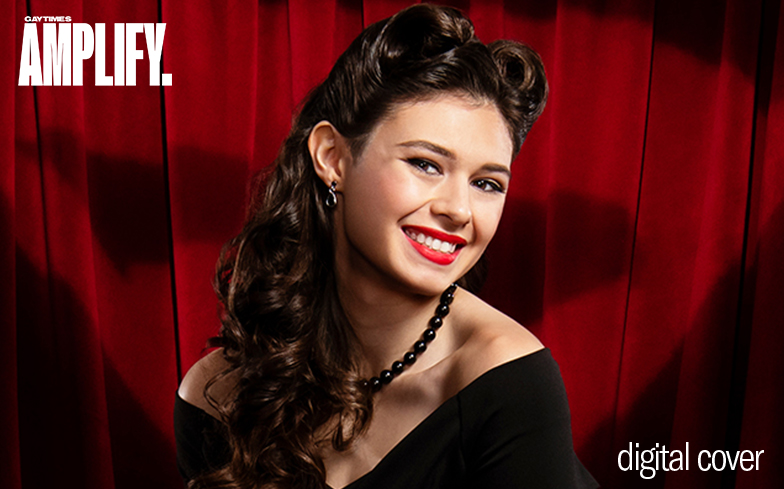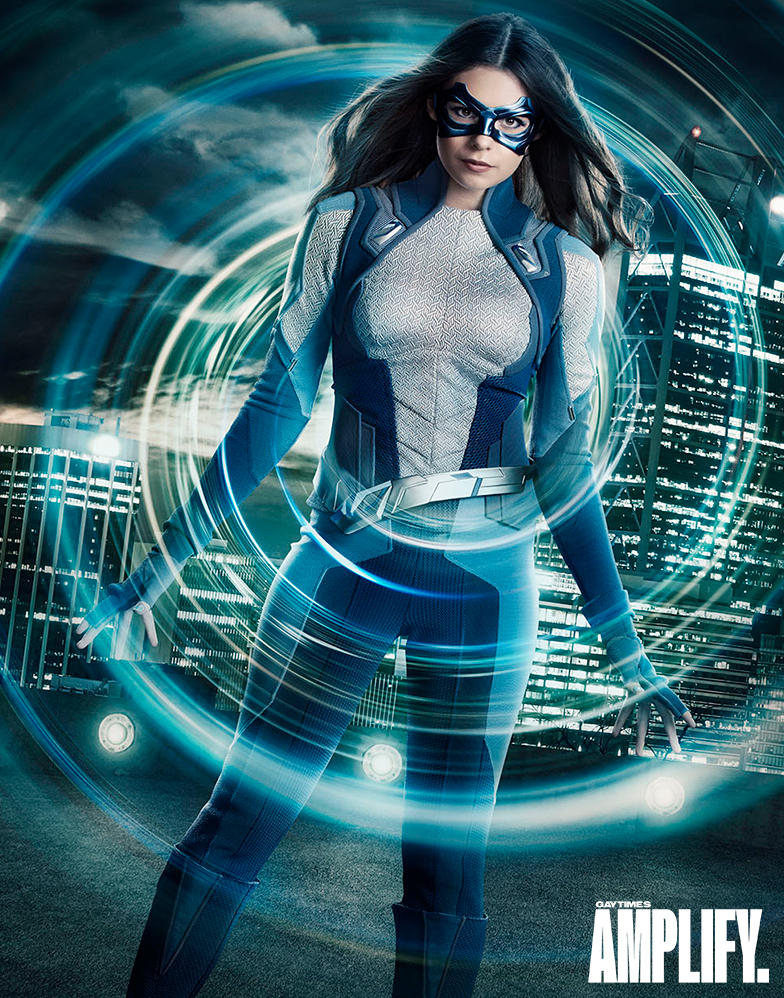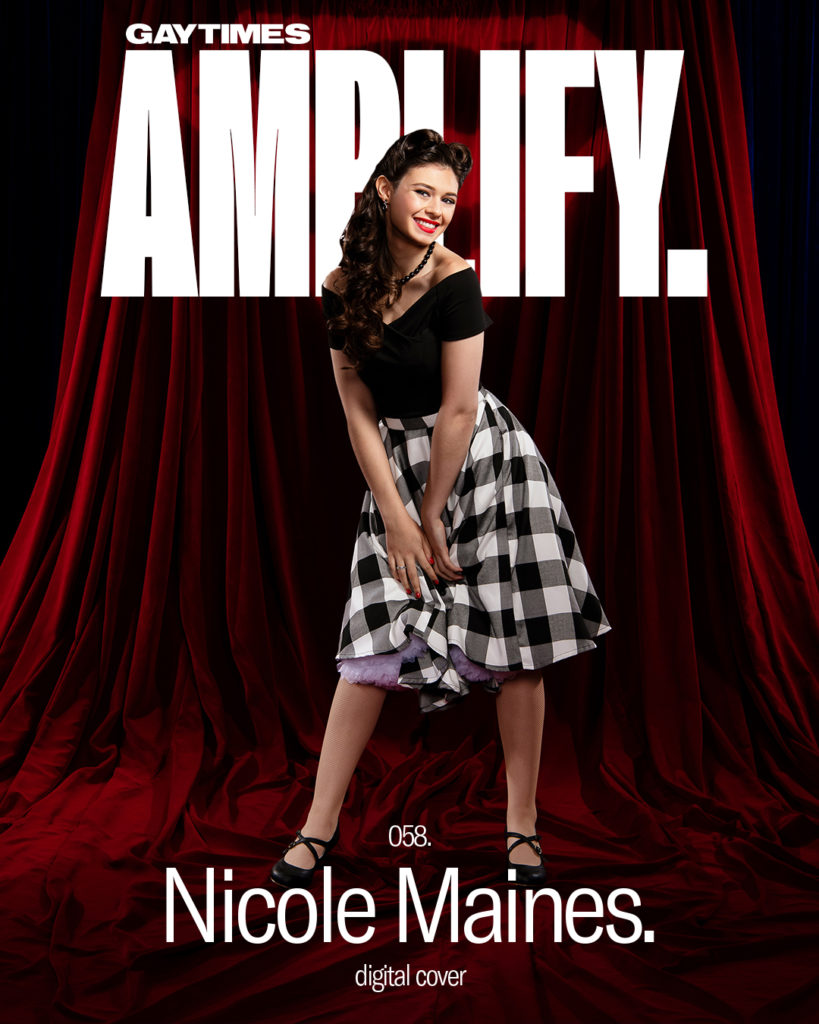
Nicole Maines is paving the way for a new generation of LGBTQ youth both on-and-off screen.
As well as being the anonymous plaintiff in the Supreme Court case Doe vs Clenchy, where she fought and won the right for transgender children to use the school bathroom that aligns with their gender identity, Nicole made history when she became the first transgender superhero on TV as Nia Nal aka Dreamer in The CW’s acclaimed adaptation of DC Comics series Supergirl – and she’s using her voice to push the show to do even more.
In a recent episode of the show, Nia’s roommate Yvette was catfished and viciously attacked by a transphobic villain who was targeting Dreamer for “tricking” people with her gender, claiming she was not “the right type of role model” a superhero should be. It’s a reflection of the real world, where trans people – particularly trans women of colour like Yvette – face disproportionate levels of harassment and violence, while gay-panic and trans-panic defences are still recognised in courts around the world.
“There are so many people who don’t even recognise that this is a real issue, they think it’s just us coming up with a fictitious thing to make trans people look more vulnerable,” says Nicole, “but trust me, we don’t need to be more vulnerable, we’re not looking for that. We wanted to bring as much honesty and truthfulness to the episode, not for some macabre murder-mystery fetish, but because we wanted people to understand exactly what the trans community is up against. Hopefully they’ll watch the episode and understand that this is not make-believe.”
We spoke to Nicole about how Supergirl is inspiring young trans kids to come out to their parents, how superheroes have always been a vehicle for social justice, and why we can’t let the coronavirus pandemic distract us from the continuing fight for trans equality.
You have the incredible honour of playing TV’s first trans superhero. Did you feel a sense of pressure when you took that role on?
Oh absolutely, there’s always a pressure when you’re playing a trans character because for me it felt like she was reflecting the entire rest of the community, so at first I was really nervous to show any darker, uglier sides of Nia because I didn’t want it to be one of those things where if Nia did something bad, it was indicative or reflective of the rest of the community. I didn’t want it to reflect badly on us. But fortunately I was able to get over that because she is not the only trans person on TV anymore, there are so many other depictions of trans folks on TV and that’s taken the pressure off all of us to have to portray trans people as squeaky clean and perfect – because honestly that’s even more damaging, it’s not realistic and it’s not honest. Aside from being the first trans superhero, it was also my first major acting role so there was a lot of pressure there because I was going onto this show with people who are so talented and had been in the game for a minute. I had no formal training and experience, so I did feel some pressure to keep up with them.

I thought the scene where Dreamer comes out as trans particularly was very powerful, partly because it was part of the wider narrative and it wasn’t turned into a massive deal. Have you had input into the way these scenes play out?
Yeah, the writers have been really fantastic coming to me with any questions or concerns they have. Especially with this latest episode, Reality Bytes, they came to me way before they even had a script written for it, they said ‘This is something we want to do, let’s have a conversation, what do we need to say with this episode’. We had an hour-long conversation where we talked about points we wanted to make, who we wanted this bad guy to be, and what do we want people to take away from this episode. There was so much integrity and honesty and it’s been so phenomenal. It wasn’t just that episode, it was also when Dreamer coming out, when Nia came out, and when Nia had that big fight with her sisters, I was a part of all of those conversations. Because they understand that I’m a resource available to them, and they want to make sure I’m comfortable with everything that’s happening.
That’s really great to hear. Like you mentioned, in a recent episode the show dealt with violence against the trans community, and that’s something that happens everyday but it feels like it’s not talked about enough. Do you hope the show can help open people’s eyes to this?
I really hope so. We did a lot of press leading up to the episode and one of the recurring comments and points I saw being made was people saying, ‘Oh this episode is so ridiculous, no one’s really attacking trans people for being trans, they’re just trying to shove an agenda down our throats’. There are so many people who don’t even recognise that this is a real issue, they think it’s just us coming up with a fictitious thing to make trans people look more vulnerable – but trust me, we don’t need to be more vulnerable, we’re not looking for that. All of the statistics and points made were accurate to the time of filming, so the mortality rate quoted was the actual mortality rate of trans women in America at the time of filming, and then it was really important that we said, ‘Actually, the real numbers are probably much higher’. We wanted to bring as much honesty and truthfulness to the episode, not for some macabre murder-mystery fetish, but because we wanted people to understand exactly what the trans community is up against. Hopefully they’ll watch the episode and understand that this is not make-believe. All of these talking points are things I’ve seen and heard, and I’m sure every other trans person has heard before, ‘You’re trying to trick people’. His whole narrative was this idea of gay panic, he felt he had to prove something with his own masculinity and salvage his own ego because he can’t stand that he was been attracted to a trans woman. So I really want people to understand that all of this is real, and yes it’s done in the context of superheroes and masks and capes, but all of that is still very real.

It’s very frustrating that some people can’t put themselves outside of their own experiences for a minute and understand that others might face struggles they don’t.
Absolutely, and they don’t think that it happens because they don’t hear about it. They don’t hear about hate crimes against trans people because its not something that’s ever really talked about. They haven’t heard about it in their circles, it’s not on their radar, it’s not a part of their world, so it’s easy for them to say, ‘That doesn’t happen, I’ve never heard of that’ – well of course you haven’t, because you haven’t looked.
What would it have meant for you to have had a character like Dreamer when you were growing up?
It would have meant the world, it would have been a complete game-changer. Being a superhero is the peak, that’s the pinnacle of success, that’s where the bar is set – if you can be a superhero, you can be anything. So when everyone else had Batman, and Spider-Man, and Superman to look up to and be role models for them, trans people never had someone like that who was thriving in that way and portrayed as powerful and indestructible. If I’d had someone like Dreamer, I could have leaned back on that a little bit, like, ‘Alright, you can say whatever you want about me, but this superhero is telling me that I can be somebody, that being trans is not an inhabitant to me, it’s not holding me back, I can be whatever I want and be trans at the same time’. So I hope kids are taking that away from Dreamer now. To see a trans person standing in line with Supergirl and Batwoman and The Flash? That is so major.
It’s incredible that you can be that inspiration to so many young trans people now. Have you had many people reach out to you to share their stories?
Yeah, absolutely, and the outpouring of messages I’ve seen is so inspiring to me. Seeing how many people have been touched by this, it’s so comforting to know that that this is doing what I wanted it to do. People tell me that Dreamer has given them the courage to come out to their parents or their friends, it’s given them the bravery to do that. It’s showing them that they can be proud of who they are, and to see that it’s actually having an effect on them is amazing. But also seeing people who aren’t trans saying, ‘Dreamer is my favourite character on the show’ – the fact that she has an appeal to people who aren’t trans shows that she’s a superhero on her own, she’s her own entity that people love and adore regardless of her gender identity because that’s not all that she is. There are other things to like about her besides her gender identity, and that’s what I really love about her.

When it comes to the more nerdy side of pop culture like comics and superheroes – which I’m fully immersed in myself – a lot of the fans have a bad reputation for homophobia, transphobia and misogyny. Have you experienced this since joining Supergirl?
Yeah, I mean, it’s really weird. Something that’s really stuck with me through this is how many comic book fans have been very, very transphobic and have been like, ‘Oh god, a trans superhero, leave politics out of comic books’, and every time I see that I’m like, ‘Are you seriously a comic book fan?’ Politics and comics have always intertwined, and superheroes especially have always been at that intersection. You’ve got Captain America who’s fighting literal Nazis, Iron Man during the Cold War, even Superman being part of an ad campaign back in the day that was like, ‘If you’re bullying someone because of the colour of their skin, that’s un-American’. Superheroes have always been at the intersection of fiction and politics, it’s always been a vehicle to talk about those things. But now that people are seeing themselves in the bad guys, they’re like, ‘Oh wait, I don’t like this anymore’. They’re all for politics in comic books so long as it’s their own politics.
You’ve been fighting for trans rights from a very young age which is really inspiring. Where do you think trans rights are at in the United States at the moment?
There’s still a long way to go. Even amidst the coronavirus outbreaks there are anti-trans bills being crammed through the legislature, there are still people trying to use this as a cover to slip really nasty bills under everyone else’s noses. We don’t even have federal rights. We had some, but they were taken away – thanks, Trump. There are, I think, 28 states where you can be fired for being trans, you can be denied housing for being trans, there are still so many places where it’s unsafe. It was referenced in this recent episode, that gay-panic is still a valid excuse in court for murdering a person. It usually doesn’t work, because it’s a fucking stupid excuse and most people will be like, ‘No way, you murdered somebody’, but the fact that it can even be considered as part of the conversation, and not be thrown out immediately, is baffling to me. So there’s still a long way to go. Even if we had all of the legislation and we had federal protections, there are still trans kids being kicked out of the house because their parents aren’t supportive. Why is that still happening? It shows we need more representation and we need to be normalising trans identities, trans lives and trans bodies.

There’s been a lot of debate recently about the lack of LGBTQ representation in superhero movies – the TV shows seem to be getting it right, but the movies… not so much. Do you think the time is coming?
I hope so! There’s a completely different audience between the Arrowverse, let’s say, and the DC Cinematic Universe or the Marvel Cinematic Universe. Those movies attract everybody because they’ve become the new blockbuster hits, that’s what everybody in Hollywood wants to do. It’s kinda funny seeing how many A-list celebrities they can fit in one movie, because they’re so damn massive. We need to start seeing LGBTQ people up there with Batman and Wonder Woman and Thor and Spider-Man, and not just as background characters or little cameos. That’s the difference, I think, between TV and movies. I think TV shows have a more niche, dedicated fanbase so they’re more emboldened to have LGBTQ characters be major players, whereas the movies are much more concerned about appealing to everybody, and appealing to the wider audience, so they don’t want to alienate potential viewers, they want to keep it ‘safe’, and so when they do show LGBTQ people it’s just a little kiss after they blew up a planet and everyone’s celebrating and there just happens to be a gay couple in the background – that’s great, and we need that, but we also need LGBTQ people to be actual players and be contributing and be part of the big conversations. We need gay superheroes and trans superheroes up there with those A-listers. It would be so impactful to see, it’s just a matter of whether they’re willing to ruffle some feathers. But I’m hopeful.
Supergirl airs on The CW in the US, and on Sky One in the UK.



